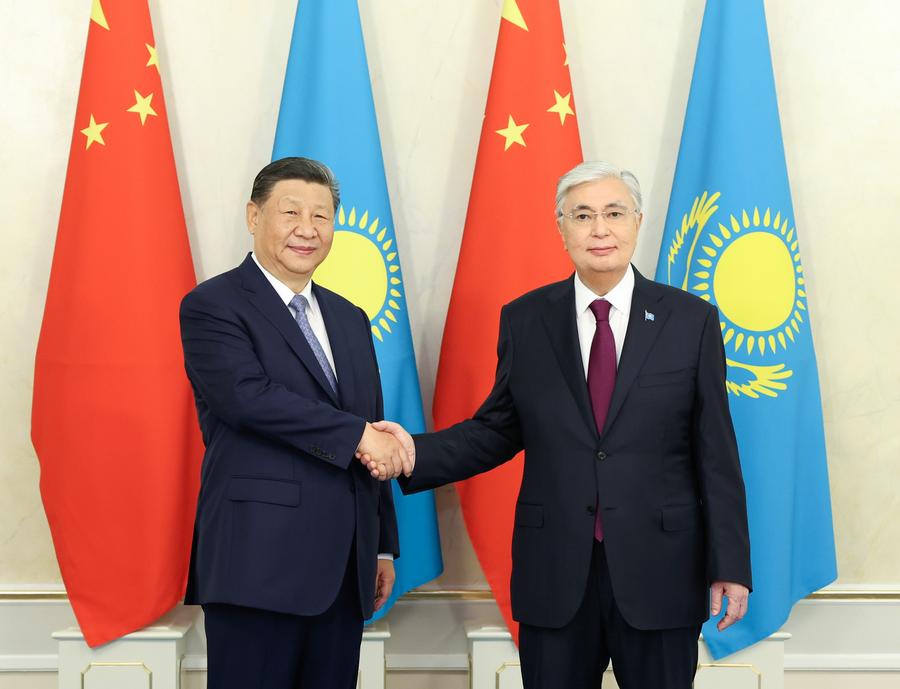President’s visit elevates bilateral relations, provides more impetus to SCO, Chinese envoy says

The state visit by President Xi Jinping to Kazakhstan this week demonstrates the high level and unique nature of Sino-Kazakh relations, China’s Ambassador to Kazakhstan Zhang Xiao said.
The visit, at the invitation of Kazakh President Kassym-Jomart Tokayev, is Xi’s second to the Central Asian country in less than two years.
During the trip from July 2 to 6, Xi attended the 24th Meeting of the Council of Heads of State of the Shanghai Cooperation Organization in Astana, the capital of Kazakhstan, in addition to making state visits to Kazakhstan and Tajikistan.
The Astana summit will surely contribute more “SCO impetus” to regional security, stability, development and revitalization, Zhang said.
President Xi’s visit to Kazakhstan will boost the traditional friendship, consolidate good-neighborliness, enhance political mutual trust, expand mutually beneficial cooperation and open up a better future, Zhang told China Daily.
Describing the Chinese leader’s trip as one of “friendship, peace and win-win cooperation”, the envoy said the visit “will surely inject strong driving force into the development of Sino-Kazakh relations and regional stability and prosperity”.
According to the ambassador, the two heads of state have guided the path of bilateral ties, thanks to their fine working relationship and personal friendship.
President Tokayev visited China twice last year and attended the Boao Forum for Asia in March this year. Xi’s latest trip, meanwhile, marks his second visit to Kazakhstan since September 2022. The frequent visits between the two leaders have set a record in the history of the two countries’ relations.
China and Kazakhstan firmly support each other on issues concerning each other’s core interests, support each other in safeguarding their respective sovereignty, security and development, and firmly oppose interference in other countries’ internal affairs, Zhang said.
China is the largest trade partner of the Central Asian neighbor. In 2023, trade between the two countries reached $41 billion, up 32 percent year-on-year. In the first five months of 2024, two-way trade hit $17.62 billion, an 18 percent increase over the same period last year.
By the end of April, the number of China-Europe freight trains that operate from the Khorgos and Alashankou land ports in Northwest China’s Xinjiang Uygur autonomous region and pass through Kazakhstan exceeded 5,000. Meanwhile, the Lianyungang Logistics Center in Jiangsu province has played an important role in ensuring the stability of the transportation trade between the two countries and the global supply chain.
Besides bilateral cooperation, the two countries also have active interaction under the framework of multilateral mechanisms, such as the United Nations, the SCO, the Conference on Interaction and Confidence-Building Measures in Asia, and the China-Central Asia Summit, Zhang said.
After 23 years, the SCO has become a regional cooperation organization with the largest territory, the largest population, and huge potential for development. It has become a channel for security, a bridge of cooperation, a bond of friendship and a constructive force in the region, the ambassador said.
“Both China and Kazakhstan are founding members of the SCO as well as active advocates and promoters of, and contributors to, the SCO’s development and cooperation in various fields,” he noted.
Zhang said that China will work with other member states to continue to support Kazakhstan in fulfilling its responsibilities under the SCO’s rotating presidency, and encourage the SCO to continue to uphold the Shanghai Spirit, strengthen institutional building and deepen cooperation in various fields, in order to play a more constructive role in promoting regional security, stability, development and prosperity.
“I would like to point out in particular that practical cooperation within the SCO not only promotes economic development and the improvement of people’s livelihoods in various countries, but also provides important support for the continuous upgrading of the Belt and Road Initiative,” he added.


